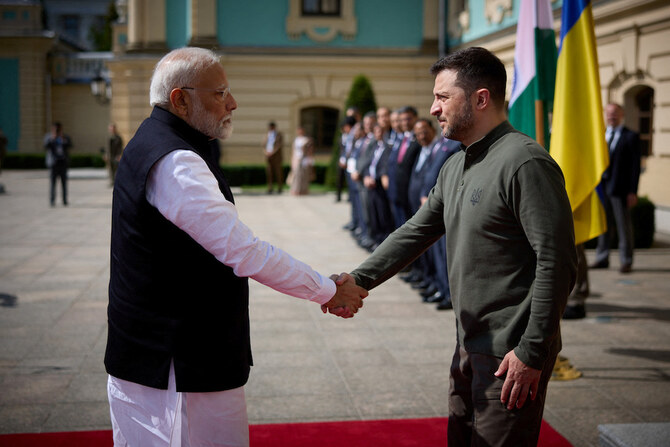KYIV: India’s Narendra Modi met President Volodymyr Zelensky in wartime Kyiv on Friday, weeks after the Ukrainian leader blasted the Indian prime minister over his trip to Moscow.
For Modi, the visit is a chance to clear the air after he was shown embracing Russian President Vladimir Putin at talks in July as Moscow staged a massive missile strike on Ukraine that struck a children’s hospital.
As he welcomed the Indian prime minister to the Marinskiy presidential palace in Kyiv, Zelensky embraced Modi with a frowning expression before they began talks. Modi issued renewed condolences over the strike on X in a post written in Ukrainian.
“Conflict is particularly devastating for young children. My heart goes out to the families of children who lost their lives, and I pray that they find the strength to endure their grief,” the post said.
The visit is important for Western-backed Kyiv, which has been trying to nurture diplomatic relations in the Global South in its efforts to secure a fair settlement to end the war with Russia.
India, which has traditionally had close economic and defense ties with Moscow, has publicly criticized the deaths of innocent people in the war, but it has also strengthened its economic ties with Moscow.
The trip comes at a volatile juncture in the fighting, with Ukrainian forces still in Russia’s western Kursk region following their incursion on Aug. 6 and Russian troops grinding out slow but steady advances in Ukraine’s east.
Modi was met off the train by Ukrainian officials who made a traditional Indian namaste greeting. He was later shown walking with Zelensky at the city’s World War Two museum, his hand on the Ukrainian leader’s shoulder.
Modi had used emotive language to deliver an implicit rebuke to Putin at their summit after the attack on the children’s hospital in Ukraine.
But the trip prompted Zelensky to say it was a “huge disappointment and a devastating blow to peace efforts to see the leader of the world’s largest democracy hug the world’s most bloody criminal in Moscow on such a day.”
‘CERTAIN INFLUENCE’
Mykhailo Podolyak, an adviser in the Ukrainian president’s office, told Reuters Modi’s visit to Kyiv was significant because New Delhi “really has a certain influence” over Moscow.
“It’s extremely important for us to effectively build relations with such countries, to explain to them what the correct end to the war is — and that it is also in their interests,” he said.
As Western nations have imposed sanctions on Russia and cut trade relations with it over the invasion, India has developed its economic ties.
Indian refiners which rarely bought Russian oil in the past have emerged as Moscow’s top clients for sea-borne oil since Russia poured troops into Ukraine in February 2022. Russian oil accounts for over two-fifths of India’s oil imports.
In the run-up to the trip Modi said he was looking forward to sharing “perspectives on peaceful resolution of the ongoing Ukraine conflict.”
Ukraine has said it hopes to bring together a second international summit later this year to advance its vision of peace and involve representatives from Russia.
The first summit in Switzerland that pointedly excluded Russia in June attracted scores of delegations, including one from India, but not from China, the world’s second largest economy.
“Lasting peace can only be achieved through options that are acceptable to both parties. And it can only be a negotiated settlement,” Tanmaya Lal, Secretary (West) in the Indian foreign ministry, told reporters.
Volodymyr Fesenko, a Kyiv-based political analyst, said he expected no breakthrough proposals to be made to end the war during the trip by Modi, who visited Poland on Thursday.
For there to be an attempt to negotiate, the military situation has to stabilize and the presidential election must be held in the United States, a close ally of Ukraine, he said.
He said the visit was important for India to demonstrate it was “not on Russia’s side” and that Kyiv wanted to normalize relations after Modi’s Moscow trip.
































